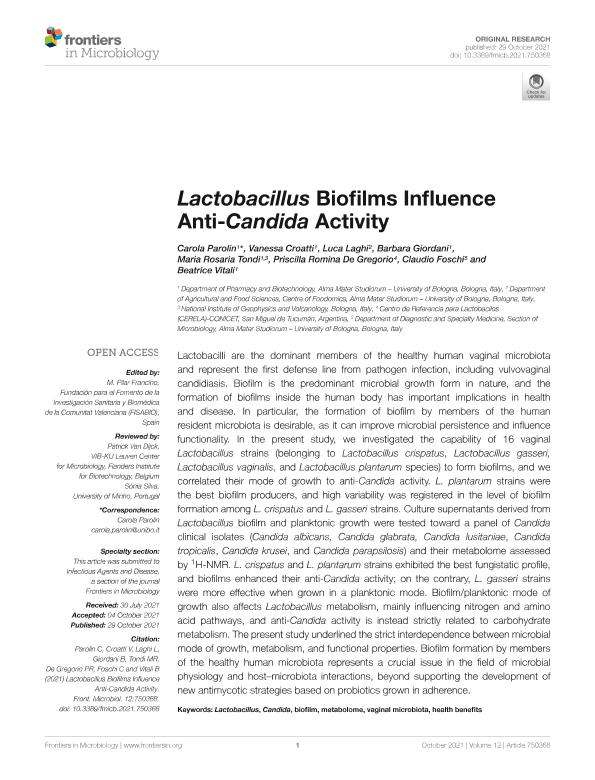Mostrar el registro sencillo del ítem
dc.contributor.author
Parolin, Carola
dc.contributor.author
Croatti, Vanessa
dc.contributor.author
Laghi, Luca
dc.contributor.author
Giordani, Barbara
dc.contributor.author
Tondi, Maria Rosaria
dc.contributor.author
de Gregorio, Priscilla Romina

dc.contributor.author
Foschi, Claudio
dc.contributor.author
Vitali, Beatrice
dc.date.available
2022-03-21T12:07:20Z
dc.date.issued
2021-10-29
dc.identifier.citation
Parolin, Carola; Croatti, Vanessa; Laghi, Luca; Giordani, Barbara; Tondi, Maria Rosaria; et al.; Lactobacillus Biofilms Influence Anti-Candida Activity; Frontiers Media; Frontiers in Microbiology; 12; 29-10-2021; 1-11
dc.identifier.issn
1664-302X
dc.identifier.uri
http://hdl.handle.net/11336/153621
dc.description.abstract
Lactobacilli are the dominant members of the healthy human vaginal microbiota and represent the first defense line from pathogen infection, including vulvovaginal candidiasis. Biofilm is the predominant microbial growth form in nature, and the formation of biofilms inside the human body has important implications in health and disease. In particular, the formation of biofilm by members of the human resident microbiota is desirable, as it can improve microbial persistence and influence functionality. In the present study, we investigated the capability of 16 vaginal Lactobacillus strains (belonging to Lactobacillus crispatus, Lactobacillus gasseri, Lactobacillus vaginalis, and Lactobacillus plantarum species) to form biofilms, and we correlated their mode of growth to anti-Candida activity. L. plantarum strains were the best biofilm producers, and high variability was registered in the level of biofilm formation among L. crispatus and L. gasseri strains. Culture supernatants derived from Lactobacillus biofilm and planktonic growth were tested toward a panel of Candida clinical isolates (Candida albicans, Candida glabrata, Candida lusitaniae, Candida tropicalis, Candida krusei, and Candida parapsilosis) and their metabolome assessed by 1H-NMR. L. crispatus and L. plantarum strains exhibited the best fungistatic profile, and biofilms enhanced their anti-Candida activity; on the contrary, L. gasseri strains were more effective when grown in a planktonic mode. Biofilm/planktonic mode of growth also affects Lactobacillus metabolism, mainly influencing nitrogen and amino acid pathways, and anti-Candida activity is instead strictly related to carbohydrate metabolism. The present study underlined the strict interdependence between microbial mode of growth, metabolism, and functional properties. Biofilm formation by members of the healthy human microbiota represents a crucial issue in the field of microbial physiology and host–microbiota interactions, beyond supporting the development of new antimycotic strategies based on probiotics grown in adherence.
dc.format
application/pdf
dc.language.iso
eng
dc.publisher
Frontiers Media

dc.rights
info:eu-repo/semantics/openAccess
dc.rights.uri
https://creativecommons.org/licenses/by/2.5/ar/
dc.subject
BIOFILM
dc.subject
CANDIDA
dc.subject
HEALTH BENEFITS
dc.subject
LACTOBACILLUS
dc.subject
METABOLOME
dc.subject
VAGINAL MICROBIOTA
dc.subject.classification
Biotecnología relacionada con la Salud

dc.subject.classification
Biotecnología de la Salud

dc.subject.classification
CIENCIAS MÉDICAS Y DE LA SALUD

dc.title
Lactobacillus Biofilms Influence Anti-Candida Activity
dc.type
info:eu-repo/semantics/article
dc.type
info:ar-repo/semantics/artículo
dc.type
info:eu-repo/semantics/publishedVersion
dc.date.updated
2021-12-03T20:08:41Z
dc.journal.volume
12
dc.journal.pagination
1-11
dc.journal.pais
Suiza

dc.journal.ciudad
Laussane
dc.description.fil
Fil: Parolin, Carola. Universidad de Bologna; Italia
dc.description.fil
Fil: Croatti, Vanessa. Universidad de Bologna; Italia
dc.description.fil
Fil: Laghi, Luca. Universidad de Bologna; Italia
dc.description.fil
Fil: Giordani, Barbara. Universidad de Bologna; Italia
dc.description.fil
Fil: Tondi, Maria Rosaria. Universidad de Bologna; Italia
dc.description.fil
Fil: de Gregorio, Priscilla Romina. Consejo Nacional de Investigaciones Científicas y Técnicas. Centro Científico Tecnológico Conicet - Tucumán. Centro de Referencia para Lactobacilos; Argentina
dc.description.fil
Fil: Foschi, Claudio. Universidad de Bologna; Italia
dc.description.fil
Fil: Vitali, Beatrice. Universidad de Bologna; Italia
dc.journal.title
Frontiers in Microbiology
dc.relation.alternativeid
info:eu-repo/semantics/altIdentifier/doi/http://dx.doi.org/10.3389/fmicb.2021.750368
dc.relation.alternativeid
info:eu-repo/semantics/altIdentifier/url/https://www.frontiersin.org/articles/10.3389/fmicb.2021.750368/
Archivos asociados
